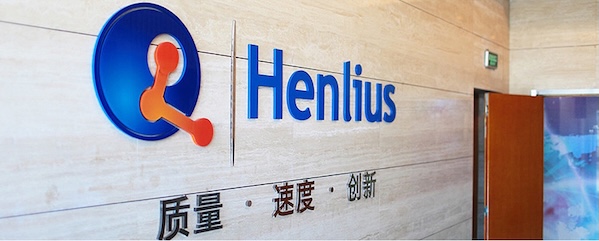Henlius HLX43 has been approved by multiple countries to conduct an international multi-center Phase II clinical trial in NSCLC, leading the global development of PD-L1 ADC
July 14, 2025
Source: drugdu
 287
287
 Recently, Henlius has made another important progress in the global development of its innovative programmed death-ligand 1 (PD-L1) antibody-drug conjugate (ADC) injection HLX43. The product has been approved by the China National Medical Products Administration (NMPA), the U.S. Food and Drug Administration (FDA), the Australian Therapeutic Goods Administration (TGA) and the Japanese Pharmaceuticals and Medical Devices Agency (PMDA) to conduct an international multicenter Phase II clinical study for advanced non-small cell lung cancer (NSCLC), and the first subject has been dosed in China. No similar ADC product targeting PD-L1 has been approved for marketing in the world, and HLX43 is the world's first PD-L1 ADC to enter Phase II clinical trials.
Recently, Henlius has made another important progress in the global development of its innovative programmed death-ligand 1 (PD-L1) antibody-drug conjugate (ADC) injection HLX43. The product has been approved by the China National Medical Products Administration (NMPA), the U.S. Food and Drug Administration (FDA), the Australian Therapeutic Goods Administration (TGA) and the Japanese Pharmaceuticals and Medical Devices Agency (PMDA) to conduct an international multicenter Phase II clinical study for advanced non-small cell lung cancer (NSCLC), and the first subject has been dosed in China. No similar ADC product targeting PD-L1 has been approved for marketing in the world, and HLX43 is the world's first PD-L1 ADC to enter Phase II clinical trials.
According to the latest data from GLOBOCAN, lung cancer is the cancer with the highest morbidity and mortality in the world. In 2022, there will be more than 2.48 million new cases of lung cancer worldwide, accounting for 12.4% of new cancer cases [1] . Among them, non-small cell lung cancer (NSCLC) is the most common type of lung cancer (about 85%). Most lung cancer patients are already in the advanced stage of the disease when diagnosed [2] . There is a huge unmet clinical need. According to pathological type, NSCLC can be divided into squamous cell carcinoma (about 30%), lung adenocarcinoma (about 50%), etc. Although targeted treatments for driver gene mutations such as EGFR (AGA) have matured, among all NSCLC patients, EGFR wild-type accounts for as high as 70%-85%, covering almost all squamous cell carcinoma patients and 50-55% of lung adenocarcinoma patients [3] . Currently, there are still few products with excellent efficacy, especially in the treatment of late-line populations such as 2L+ patients, which still mainly rely on docetaxel-based chemotherapy regimens, and the effect of late-line treatment is limited [4,5] .
HLX43 is a new ADC drug candidate targeting programmed death-ligand 1 (PD-L1), which is composed of a fully human IgG1 anti-PD-L1 antibody coupled with an innovative linker-topoisomerase inhibitor payload, with a drug-to-antibody ratio (DAR) of about 8. HLX43 has the combined functions of toxin precision killing and tumor immunity: its toxin can not only enter tumor cells through target endocytosis and then be released, but also enter tumor cells with the help of bystander effect after being released in the tumor microenvironment, blocking DNA replication, thereby leading to tumor cell apoptosis; in addition, HLX43's PD-L1 targeting antibody can activate the immune regulation mechanism and exert a synergistic anti-tumor effect.
At the 2025 American Society of Clinical Oncology (ASCO) Annual Meeting, the Phase I clinical data of HLX43 was released for the first time, showing encouraging preliminary efficacy and safety, and showing excellent therapeutic potential for squamous/non-squamous NSCLC, patients with or without EGFR mutations, with or without brain/liver metastases, and PD-L1 positive/negative NSCLC. Studies have shown that when HLX43 is infused once every three weeks at 2.0 mg/kg, the ORR of patients with advanced NSCLC assessed by researchers is 38.1%, and for patients with refractory NSCLC who are receiving fourth-line and later-line treatment, the ORR can still reach 38.5%. Among them, the objective response rate (ORR) of patients with squamous non-small cell lung cancer sqNSCLC (n=15) and non-squamous non-small cell lung cancer nsqNSCLC (n=6) was 40% and 33.3%, respectively, and 73.3% and 100% disease control were achieved. It is worth noting that all patients with brain metastasis NSCLC achieved disease control (DCR=100%). In addition to NSCLC, HLX43 showed significant efficacy in the thymic squamous cell carcinoma (TSCC) patient population, with an ORR of 75% (3/4 patients).
Currently, the company is making every effort to promote the clinical development of HLX43 and actively explore its therapeutic potential in a variety of solid tumors, including non-small cell lung cancer, thymic squamous cell carcinoma, hepatocellular carcinoma, esophageal squamous cell carcinoma, head and neck squamous cell carcinoma, cervical cancer, nasopharyngeal carcinoma, etc. In addition to single-drug, the Phase Ib/II clinical trial of HLX43 combined with Henlius' self-developed slulizumab (H drug Hans-like®, anti-PD-1 monoclonal antibody) for the treatment of solid tumors is also underway to further explore the synergistic anti-tumor efficacy of "ADC+IO". HLX43 may not only overcome the problem of non-response or drug resistance to PD-1/L1 immunotherapy, but also has potential efficacy for patients who have failed chemotherapy and TKI treatment, and is expected to bring new treatment options to more patients with advanced/metastatic solid tumors.
In the future, Henlius will accelerate the global research and development of HLX43, continuously consolidate the differentiated layout of more innovative molecules, and bring high-quality, affordable innovative treatment solutions to more cancer patients.
https://news.yaozh.com/archive/45756.html
By editorRead more on
- Rovaxitinib approved for marketing, filling the demand for myelofibrosis treatment March 2, 2026
- Warrant Pharmaceuticals’ active pharmaceutical ingredient receives Brazil’s first official GMP certification March 2, 2026
- Merck’s New Story March 2, 2026
- Rongchang Biotechnology has turned a profit! March 2, 2026
- Jiuyuan Gene’s “Simeglucopyranoside” for weight loss (Jikeqin®) has been submitted for market approval March 2, 2026
your submission has already been received.
OK
Subscribe
Please enter a valid Email address!
Submit
The most relevant industry news & insight will be sent to you every two weeks.



